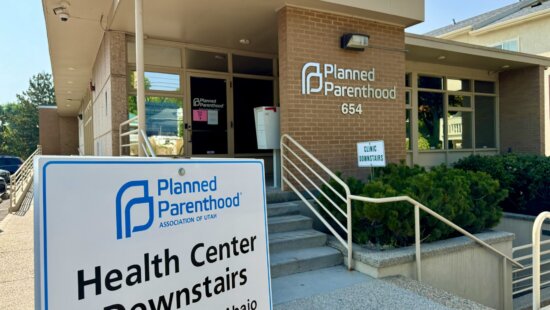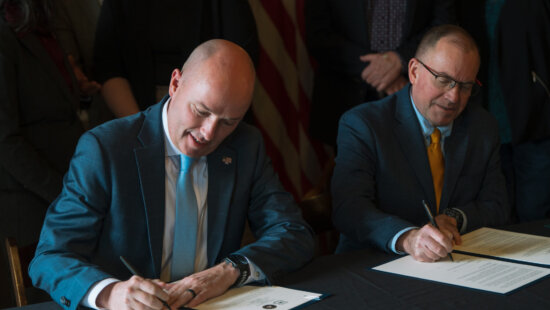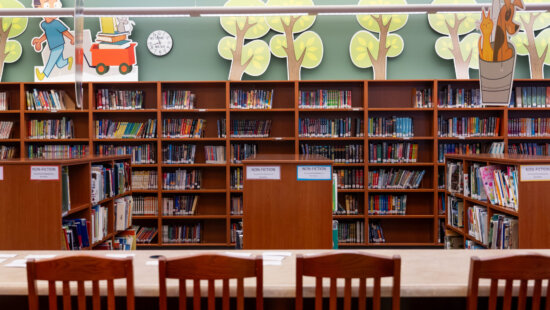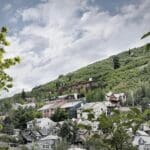News
University of Utah ‘will continue to enforce the rule of law’ on pro-Palestine protests
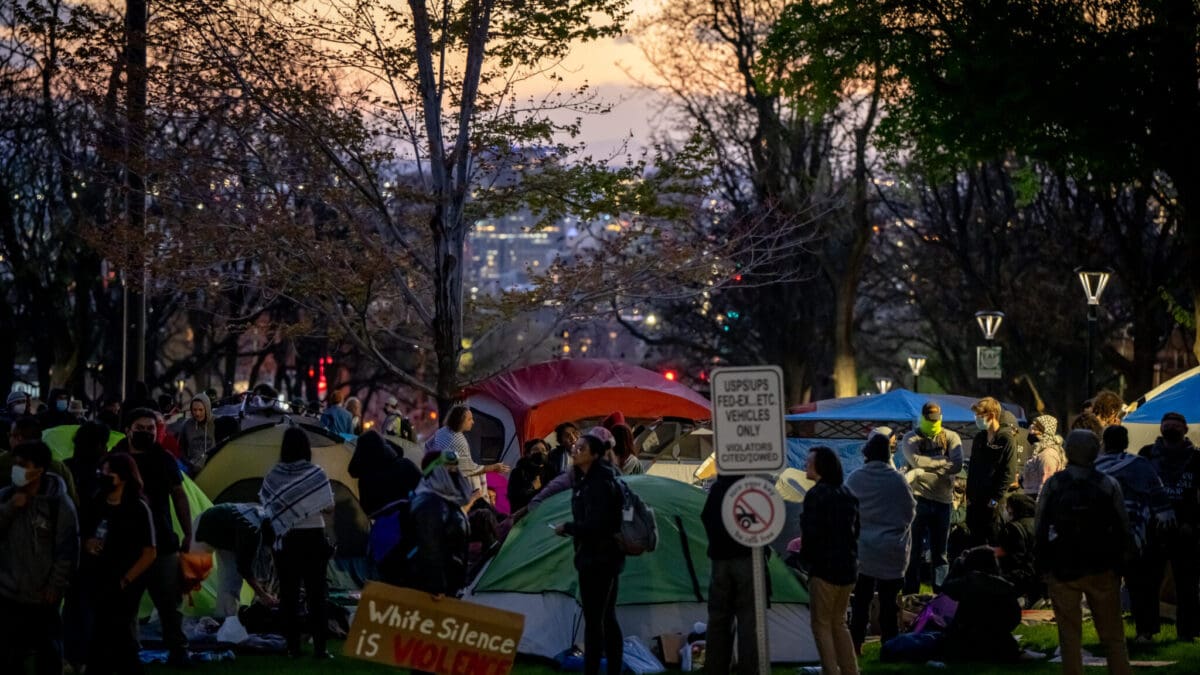
People set up a protest encampment in support of Palestine at the University of Utah in Salt Lake City on Monday, April 29, 2024. Photo: Spenser Heaps for Utah News Dispatch
20 people were arrested after students installed tents on campus
By: Alixel Cabrera and Kyle Dunphey, Utah News Dispatch
After 19 people were arrested at a pro-Palestine rally at the University of Utah on Monday night, the school reiterated it would not allow overnight camping and will continue to enforce the rule of law, while many criticized the violent reaction to what started as a peaceful protest.
According to an update from the university, police officers arrested four students and one university employee. The University of Utah Police Department will review the arrestees’ information and body camera footage to refer cases to the Salt Lake City Prosecutor’s Office and the Dean of Students.
A 20th person was arrested Tuesday night. Other protesters identified him as a student organizer.
Possible charges include trespassing, disorderly conduct and interfering with a police officer. Students could be disciplined by the Dean of Students’ Office, but that process could take months and run parallel with court cases, a university spokesperson said.
In the aftermath, the University of Utah President Taylor Randall issued a statement arguing that while the school supported the students’ constitutional rights, establishing a camp on the university’s lawn was in violation of school policy and state law.

“At the University of Utah, you have an absolute right to express your opinion. You do not have the right to violate law or university policy. It is unlawful to set up structures or camp overnight on university property,” Randall wrote. “The University of Utah will continue to support free expression and enforce the rule of law.”
There were several attempts by the school’s administration and the academic senate to speak with the protesters, he said, to explain that the establishment of an encampment was unlawful.
He also noted that on Thursday the university is scheduled to hold its graduation ceremony and asked the community to express its views “in a dignified, peaceful, and legal manner.”
Ahead of Tuesday night’s protest, the university said it would pass out a flyer to demonstrators that described what would be allowed. Students can exercise their right to peacefully assemble, but couldn’t be violent, obstruct egress or operations or cause damage, according to the flyer.
The statement, posted on Randall’s Instagram account, received more than 300 comments just an hour after its publication. Many of them criticized the fact that students are allowed to camp for sports events, but those who set up tents in protest were met with rubber bullets.
Others called out that while the demonstration was peaceful, it was dispersed with violence. “I have seen fraternity parties on your campus cause 10x more disruption,” a commenter said. “You should be so ashamed and embarrassed.”
Athletics-related overnight encampments, such as ESPN Game Day, have been sanctioned University of Utah events with permits, according to Rebecca Walsh, a spokesperson from the school.
“Differences from yesterday’s protest include — no protest permit filed, no university event associated,” Walsh said in an email. The campus is comparable to the grounds of the state Capitol or a city park, she added, which close at dusk.
The university has allowed erecting structures — such as tents — on campus with a permit since the 1980s, after students installed shanties in an anti-Apartheid protest.
“The purpose of the structures under that policy is to ‘express their view and opinions,’ not just as a means of occupying space and setting up a camp to sleep overnight. The shanties were part of the message,” she said

Regarding potential charges, Salt Lake County District Attorney Sim Gill said the office is “monitoring the situation on the University of Utah campus. We have not yet had anything submitted to our office related to last night’s protest and arrests.”
Any class A misdemeanors or felonies would be handled by Gill’s office, a spokesman said — lower charges, like class B or C misdemeanors, are typically handled by Salt Lake City prosecutors. The office said it was still too early to tell how the county will handle the arrested protesters, the majority of whom were not University of Utah students.
Though charges have not been filed yet, affidavits from University of Utah Police submitted on Tuesday morning list a number of alleged offenses by protesters — they include class A misdemeanors like failing to stop at the command of law enforcement, and lower-level offenses like failure to disperse, disorderly conduct and criminal trespass upon an institution of higher learning.
The probable cause statement detailing one protester’s arrest describes him being shot with a 40mm marker munition, a less lethal weapon to disperse protests which released pyrotechnic smoke to mark the demonstrator, after he “was seen attempting to pick up (an) object from the ground to throw at police.”
The protester was arrested for investigation of five misdemeanors and one infraction after he was tackled on the sidewalk and placed in handcuffs.

According to a midnight update from the university’s Department of Public Safety, final exams continued on Tuesday. Utah Transit Authority buses and campus shuttles are in operation, as well as its hospitals and clinics.
Campus protests continue, but without camping
The protests continued Tuesday evening, but with a markedly different police response. At about 6 p.m., a crowd gathered again near Presidents Circle at the University of Utah, but unlike Monday, there was no plan to camp.
“The university commends the peaceful nature of the protests, which were expressed with dignity and conducted in a lawful manner,” a spokesperson for the University of Utah said in a statement.
Shortly after the protest started, a student organizer was taken into custody. The university said they were arrested based on three charges from Monday evening’s protest and violent police response — trespassing, disorderly conduct and failure to disperse. The organizer was also charged with resisting Tuesday’s arrest.
The university said there’s now a total of 20 arrests stemming from Monday’s protest — most are based on either disorderly conduct, trespassing and failure to disperse.
“I ask for the community’s patience as we manage a complex situation and balance free expression with lawful conduct. We are investing time and resources now to support free speech and prevent further escalation,” said Randall, the university president, in a statement.
The arrest of the organizer on Tuesday prompted protesters to disperse and head to the Salt Lake County Jail in South Salt Lake, where a crowd of about 200 people marched around the building demanding the student’s release.
Protesters waved banners and signs reading “Free Palestine,” “End all U.S. aid to apartheid Israel,” and “Your silence = violence,” while the crowd chanted “From the river to the sea, Palestine will be free.”
“We demand they release Julio and we demand Israel release all political prisoners,” one of the organizers shouted into the microphone, referring to the student arrested.
Police presence remained light outside the jail, with a few sheriff’s deputies hanging around the entrance and advising protesters on where they could and couldn’t gather.
Seth Anderson, a protester with the group Armed Queers, said the protests have been aimed at convincing the University of Utah to divest from companies that support the Israeli occupation of Palestine.
Anderson pointed to recent moves from universities to consider divesting academically from Israel, including Brown, which on Tuesday agreed to hold a divestment vote.
“They’re divesting academically from Israel, so we’re hoping to see something similar here. And there are a lot of people who want this to continue,” Anderson said.
The police response on Tuesday made Andesron and other protesters nervous going forward — still, they don’t plan on stopping.
“There’s going to be a lot more tension around these types of protests, which at least in Utah, have been very peaceful,” Anderson said.

Earlier demonstration ends in disarray as protesters are marched off campus
Hundreds of students gathered at the university’s Presidents Circle on Monday at around 4 p.m. Hours later, some of them installed tents and stocked up on supplies to remain in place until university officials took action on their demand to cut ties with anyone with connections to Israel and its war with Gaza.
The demonstration remained peaceful and often relatively quiet most of the afternoon, until the sun set and hundreds of officers, as University of Utah Police — working in collaboration with Salt Lake City Police, Unified Police, Utah Highway Patrol and West Valley City Police, most in riot gear — warned that protesters would face criminal consequences in they kept the structures overnight.
Officers dragged or carried some of the protesters out of the encampment before arresting them, used force to tear down some of the dozen tents installed on campus, and a few students took the rest of them down before leaving the tense scene.
By 12:20 a.m. only about a dozen students, pushed outside of the lawn and off university property onto 1300 East, remained on site and officers left the scene.
Walsh said officers pushed the students off campus, even after the tents were dismantled, because once the protest was declared an unlawful gathering, police made the decision to clear the space to prevent another encampment.
“At that point — 11 p.m. — campus was closed. Officers continued to advance west to make certain no one returned to set up the tents again,” the U. spokesperson said.

The police forces removed about a dozen tents, stashes of water bottles, food and toilet paper. No protesters were reported to be injured, a statement from the school said. Two officers were injured, though no details about their injuries were provided, and one hatchet was confiscated.
“Utah college campuses around the state are not exempt from the significant unrest that currently exists in our country and world,” said Keith Squires, University of Utah chief safety officer in a statement at 1:50 a.m. on Tuesday. “Campuses serve as a stage and forum for not just students, but for members of the community who want their voice to be heard. We honor all voices, but the right to speech on our campus must occur within the confines of state law and campus policies.”
The American Civil Liberties Union of Utah urged the school and the state to respect the demonstrators’ First Amendment rights and their safety as, they said, “protest is a fundamental cornerstone of our democracy.” Limiting that would severely affect free speech rights on every issue.
“Last night’s police response to the peaceful demonstration at the University of Utah risked the safety and well-being of those directly involved as well as those in the area,” the organization wrote. “While authorities may enforce state laws and campus policies, we are gravely concerned that campuses and law enforcement nationwide are increasingly cracking down on political expression, rushing in police to arrest protestors, and authorizing aggressive treatment.”

















